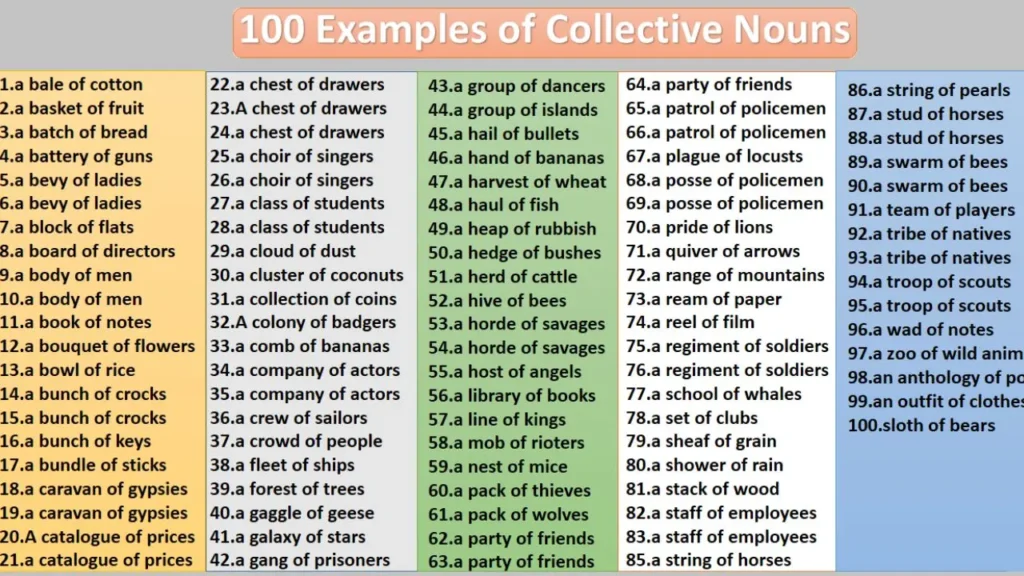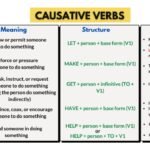What Is Generalising Collective Noun? Let us tell you that Generalising Collective Noun is a part of Collective Noun. We have explained it in detail below, so read the post till the end.
What is Generalising Collective Noun?
Definition: A collection (Collective Noun) that is made of different types of members is called Generalising Collective Noun.
Example: Scenery (Natural Scenery), Machinery (All types of Machines), Jewellery, Crockery (Group of Utensils), Furniture, Luggage etc.
Definition: A group (Collective Noun) that is made up of different types of members is called Generalising Collective Noun.
Rules of Generalising Collective Noun
Rule(i): It is singular & gets singular verb.
Examples:
- The team is practicing for the championship.
- The class is studying for the final exam.
- The jury is reaching its verdict.
- The committee is finalizing the report.
- The family is going on vacation.
- The audience is applauding the performance.
- The crew is preparing the ship for departure.
- The staff is working on the new project.
- The orchestra is playing a beautiful symphony.
- The government is implementing new policies.
Rule (ii): ‘S’ or ‘es’ does not come with it.
Example:
- The Scenery of Kashmir is very eye-catching. (x) / The Sceneries of Kashmir are very eye-catching. (x) / The Scenery of Kashmir is very eye-catching. (✓)
- Teams (plural of team) – The teams are competing in the tournament.
- Classes (plural of class) – The classes are taking their final exams.
- Juries (plural of jury) – The juries are deliberating on the cases.
- Committees (plural of committee) – The committees are working on their respective projects.
- Families (plural of family) – The families are attending the reunion.
- Audiences (plural of audience) – The audiences are enjoying the new movie.
- Crews (plural of crew) – The crews are stationed at different ports.
- Staffs (plural of staff – although “staff” is often used as a collective noun with a singular verb, it can be pluralized in some contexts) – The staffs are meeting to discuss the new policy.
- Orchestras (plural of orchestra) – The orchestras are performing at different venues.
- Governments (plural of government) – The governments are negotiating a trade agreement.
Examples of Generalising Collective Noun
- Scenery (Natural Scenery): The Scenery of Kashmir is very eye-catching.
- Machinery (all types of machines): The factory hummed with the rhythmic clanking of machinery, tirelessly assembling components to meet production demands.
- Jewellery: Adorning herself with exquisite Jewellery, she shimmered under the soft glow of the evening lights, each piece telling a story of elegance and grace.

100 Examples Of Generalist Collective Noun
50 Collective Nouns with Singular Verbs
- The team is winning the match.
- The class is taking a field trip.
- The committee is discussing the proposal.
- The family is planning a vacation.
- The jury is reviewing the evidence.
- The audience is applauding the performance.
- The orchestra is performing a symphony.
- The crew is setting up the equipment.
- The staff is handling the reservations.
- The board is making new regulations.
- The squad is preparing for the game.
- The council is organizing the community event.
- The faculty is researching new methods.
- The choir is practicing for the concert.
- The organization is launching a new campaign.
- The cast is rehearsing for the play.
- The company is expanding its operations.
- The committee is evaluating the submissions.
- The audience is reacting positively to the show.
- The class is working on their group project.
- The family is decorating for the holiday.
- The team is analyzing the data.
- The panel is assessing the proposals.
- The troupe is touring across Europe.
- The association is hosting a charity event.
- The club is planning a new initiative.
- The network is improving its infrastructure.
- The society is preparing for its annual meeting.
- The guild is working on a new collaboration.
- The group is strategizing for the campaign.
- The task force is handling the crisis.
- The band is recording a new album.
- The firm is launching a new product line.
- The panel is finalizing the regulations.
- The troop is gearing up for the adventure.
- The class is conducting an experiment.
- The committee is drafting a new policy.
- The team is coordinating the project.
- The family is enjoying a weekend getaway.
- The department is reorganizing its workflow.
- The guild is creating new designs.
- The committee is addressing the community concerns.
- The faculty is evaluating the new curriculum.
- The orchestra is rehearsing for the concert.
- The audience is engaged in the presentation.
- The staff is updating the database.
- The club is hosting a networking event.
- The team is working on the prototype.
- The board is overseeing the development.
- The troupe is practicing for their next show.
50 Plural Forms of Collective Nouns
- Teams (plural of team): The teams are competing in the tournament.
- Classes (plural of class): The classes are studying for their finals.
- Committees (plural of committee): The committees are organizing separate events.
- Families (plural of family): The families are participating in the festival.
- Juries (plural of jury): The juries are deliberating on different cases.
- Audiences (plural of audience): The audiences are reacting to the performances.
- Orchestras (plural of orchestra): The orchestras are performing in various cities.
- Crews (plural of crew): The crews are working on different ships.
- Staffs (plural of staff): The staffs are handling various tasks.
- Boards (plural of board): The boards are setting new policies.
- Squads (plural of squad): The squads are training for their missions.
- Councils (plural of council): The councils are meeting to discuss local issues.
- Faculties (plural of faculty): The faculties are attending a conference together.
- Choirs (plural of choir): The choirs are performing at different events.
- Organizations (plural of organization): The organizations are collaborating on the project.
- Casts (plural of cast): The casts are preparing for their respective performances.
- Companies (plural of company): The companies are competing in the market.
- Panels (plural of panel): The panels are discussing various topics at the seminar.
- Troupes (plural of troupe): The troupes are touring different regions.
- Associations (plural of association): The associations are hosting joint events.
- Groups (plural of group): The groups are collaborating on different projects.
- Unions (plural of union): The unions are negotiating with management.
- Departments (plural of department): The departments are working on their annual reports.
- Clubs (plural of club): The clubs are organizing various activities for their members.
- Networks (plural of network): The networks are upgrading their systems.
- Societies (plural of society): The societies are planning their annual gatherings.
- Guilds (plural of guild): The guilds are collaborating on new projects.
- Task Forces (plural of task force): The task forces are addressing different issues.
- Bands (plural of band): The bands are performing at different venues.
- Firms (plural of firm): The firms are launching new ventures.
- Troops (plural of troop): The troops are stationed in various locations.
- Groups (plural of group): The groups are working on different phases of the project.
- Clubs (plural of club): The clubs are hosting their annual tournaments.
- Committees (plural of committee): The committees are reviewing multiple proposals.
- Classes (plural of class): The classes are preparing for their final exams.
- Teams (plural of team): The teams are competing in the league.
- Associations (plural of association): The associations are collaborating on charity work.
- Panels (plural of panel): The panels are evaluating different strategies.
- Groups (plural of group): The groups are discussing their findings.
- Departments (plural of department): The departments are organizing the annual conference.
- Guilds (plural of guild): The guilds are preparing for a joint exhibition.
- Societies (plural of society): The societies are hosting a cultural event.
- Networks (plural of network): The networks are collaborating on a new initiative.
- Firms (plural of firm): The firms are competing for market share.
- Bands (plural of band): The bands are touring across the country.
- Troupes (plural of troupe): The troupes are rehearsing for their upcoming shows.
- Teams (plural of team): The teams are working on separate projects.
- Clubs (plural of club): The clubs are organizing community service events.
- Groups (plural of group): The groups are working on collaborative research.
- Unions (plural of union): The unions are advocating for worker rights.
Conclusion:
Above we have tried to tell about Generalising Collective Noun, hope you all liked the information given in it.
Read Also:






